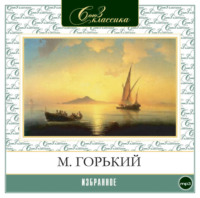 полная версия
полная версияThe Man Who Was Afraid
“Your Honour!” a hoarse cry rang out near Foma’s ears, “contribute some brandy in honour of the building!”
Foma glanced at the petitioner indifferently; he was a huge, bearded fellow, barefooted, with a torn shirt and a bruised, swollen face.
“Get away!” muttered Foma, and turned away from him.
“Merchant! When you die you can’t take your money with you. Give me for one glass of brandy, or are you too lazy to put your hand into your pocket?”
Foma again looked at the petitioner; the latter stood before him, covered more with mud than with clothes, and, trembling with intoxication, waited obstinately, staring at Foma with blood-shot, swollen eyes.
“Is that the way to ask?” inquired Foma.
“How else? Would you want me to go down on my knees before you for a ten-copeck piece?” asked the bare-footed man, boldly.
“There!” and Foma gave him a coin.
“Thanks! Fifteen copecks. Thanks! And if you give me fifteen more I’ll crawl on all fours right up to that tavern. Do you want me to?” proposed the barefooted man.
“Go, leave me alone!” said Foma, waving him off with his hand.
“He who gives not when he may, when he fain would, shall have nay,” said the barefooted man, and stepped aside.
Foma looked at him as he departed, and said to himself:
“There is a ruined man and yet how bold he is. He asks alms as though demanding a debt. Where do such people get so much boldness?”
And heaving a deep sigh, he answered himself:
“From freedom. The man is not fettered. What is there that he should regret? What does he fear? And what do I fear? What is there that I should regret?”
These two questions seemed to strike Foma’s heart and called forth in him a dull perplexity. He looked at the movement of the working people and kept on thinking: What did he regret? What did he fear?
“Alone, with my own strength, I shall evidently never come out anywhere. Like a fool I shall keep on tramping about among people, mocked and offended by all. If they would only jostle me aside; if they would only hate me, then – then – I would go out into the wide world! Whether I liked or not, I would have to go!”
From one of the landing wharves the merry “dubinushka” [“Dubinushka,” or the “Oaken Cudgel,” is a song popular with the Russian workmen.] had already been smiting the air for a long time. The carriers were doing a certain work, which required brisk movements, and were adapting the song and the refrain to them.
“In the tavern sit great merchantsDrinking liquors strong,”narrated the leader, in a bold recitative. The company joined in unison:
“Oh, dubinushka, heave-ho!”And then the bassos smote the air with deep sounds:
“It goes, it goes.”And the tenors repeated:
“It goes, it goes.”Foma listened to the song and directed his footsteps toward it, on the wharf. There he noticed that the carriers, formed in two rows, were rolling out of the steamer’s hold huge barrels of salted fish. Dirty, clad in red blouses, unfastened at the collar, with mittens on their hands, with arms bare to the elbow, they stood over the hold, and, merrily jesting, with faces animated by toil, they pulled the ropes, all together, keeping time to their song. And from the hold rang out the high, laughing voice of the invisible leader:
“But for our peasantThere is not enough vodka.”And the company, like one huge pair of lungs, heaved forth loudly and in unison:
“Oh, dubinushka, heave-ho!”Foma felt pleased and envious as he looked at this work, which was as harmonious as music. The slovenly faces of the carriers beamed with smiles, the work was easy, it went on smoothly, and the leader of the chorus was in his best vein. Foma thought that it would be fine to work thus in unison, with good comrades, to the tune of a cheerful song, to get tired from work to drink a glass of vodka and eat fat cabbage soup, prepared by the stout, sprightly matron of the company.
“Quicker, boys, quicker!” rang out beside him someone’s unpleasant, hoarse voice.
Foma turned around. A stout man, with an enormous paunch, tapped on the boards of the landing bridge with his cane, as he looked at the carriers with his small eyes and said:
“Bawl less and work faster.”
His face and neck were covered with perspiration; he wiped it off every now and then with his left hand and breathed heavily, as though he were going uphill.
Foma cast at the man a hostile look and thought:
“Others are working and he is sweating. And I am still worse than he. I’m like a crow on the fence, good for nothing.”
From each and every impression there immediately stood out in his mind the painful thought of his unfitness for life. Everything that attracted his attention contained something offensive to him, and this something fell like a brick upon his breast. At one side of him, by the freight scales, stood two sailors, and one of them, a square-built, red-faced fellow, was telling the other:
“As they rushed on me it began for fair, my dear chap! There were four of them – I was alone! But I didn’t give in to them, because I saw that they would beat me to death! Even a ram will kick out if you fleece it alive. How I tore myself away from them! They all rolled away in different directions.”
“But you came in for a sound drubbing all the same?” inquired the other sailor.
“Of course! I caught it. I swallowed about five blows. But what’s the difference? They didn’t kill me. Well, thank God for it!”
“Certainly.”
“To the stern, devils, to the stern, I’m telling you!” roared the perspiring man in a ferocious voice at two carriers who were rolling a barrel of fish along the deck.
“What are you yelling for?” Foma turned to him sternly, as he had started at the shout.
“Is that any of your business?” asked the perspiring man, casting a glance at Foma.
“It is my business! The people are working and your fat is melting away. So you think you must yell at them?” said Foma, threateningly, moving closer toward him.
“You – you had better keep your temper.”
The perspiring man suddenly rushed away from his place and went into his office. Foma looked after him and also went away from the wharf; filled with a desire to abuse some one, to do something, just to divert his thoughts from himself at least for a short while. But his thoughts took a firmer hold on him.
“That sailor there, he tore himself away, and he’s safe and sound! Yes, while I – ”
In the evening he again went up to the Mayakins. The old man was not at home, and in the dining-room sat Lubov with her brother, drinking tea. On reaching the door Foma heard the hoarse voice of Taras:
“What makes father bother himself about him?”
At the sight of Foma he stopped short, staring at his face with a serious, searching look. An expression of agitation was clearly depicted on Lubov’s face, and she said with dissatisfaction and at the same time apologetically:
“Ah! So it’s you?”
“They’ve been speaking of me,” thought Foma, as he seated himself at the table. Taras turned his eyes away from him and sank deeper in the armchair. There was an awkward silence lasting for about a minute, and this pleased Foma.
“Are you going to the banquet?”
“What banquet?”
“Don’t you know? Kononov is going to consecrate his new steamer. A mass will be held there and then they are going to take a trip up the Volga.”
“I was not invited,” said Foma.
“Nobody was invited. He simply announced on the Exchange: ‘Anybody who wishes to honour me is welcome!
“I don’t care for it.”
“Yes? But there will be a grand drinking bout,” said Lubov, looking at him askance.
“I can drink at my own expense if I choose to do so.”
“I know,” said Lubov, nodding her head expressively.
Taras toyed with his teaspoon, turning it between his fingers and looking at them askance.
“And where’s my godfather?” asked Foma.
“He went to the bank. There’s a meeting of the board of directors today. Election of officers is to take place.
“They’ll elect him again.”
“Of course.”
And again the conversation broke off. Foma began to watch the brother and the sister. Having dropped the spoon, Taras slowly drank his tea in big sips, and silently moving the glass over to his sister, smiled to her. She, too, smiled joyously and happily, seized the glass and began to rinse it assiduously. Then her face assumed a strained expression; she seemed to prepare herself for something and asked her brother in a low voice, almost reverently:
“Shall we return to the beginning of our conversation?”
“If you please,” assented Taras, shortly.
“You said something, but I didn’t understand. What was it? I asked: ‘If all this is, as you say, Utopia, if it is impossible, dreams, then what is he to do who is not satisfied with life as it is?’”
The girl leaned her whole body toward her brother, and her eyes, with strained expectation, stopped on the calm face of her brother. He glanced at her in a weary way, moved about in his seat, and, lowering his head, said calmly and impressively:
“We must consider from what source springs that dissatisfaction with life. It seems to me that, first of all, it comes from the inability to work; from the lack of respect for work. And, secondly, from a wrong conception of one’s own powers. The misfortune of most of the people is that they consider themselves capable of doing more than they really can. And yet only little is required of man: he must select for himself an occupation to suit his powers and must master it as well as possible, as attentively as possible. You must love what you are doing, and then labour, be it ever so rough, rises to the height of creativeness. A chair, made with love, will always be a good, beautiful and solid chair. And so it is with everything. Read Smiles. Haven’t you read him? It is a very sensible book. It is a sound book. Read Lubbock. In general, remember that the English people constitute the nation most qualified for labour, which fact explains their astonishing success in the domain of industry and commerce. With them labour is almost a cult. The height of culture stands always directly dependent upon the love of labour. And the higher the culture the more satisfied are the requirements of man, the fewer the obstacles on the road toward the further development of man’s requirements. Happiness is possible – it is the complete satisfaction of requirements. There it is. And, as you see, man’s happiness is dependent upon his relation toward his work.”
Taras Mayakin spoke slowly and laboriously, as though it were unpleasant and tedious for him to speak. And Lubov, with knitted brow, leaning toward him, listened to his words with eager attention in her eyes, ready to accept everything and imbibe it into her soul.
“Well, and suppose everything is repulsive to a man?” asked Foma, suddenly, in a deep voice, casting a glance at Taras’s face.
“But what, in particular, is repulsive to the man?” asked Mayakin, calmly, without looking at Foma.
Foma bent his head, leaned his arms against the table and thus, like a bull, went on to explain himself:
“Nothing pleases him – business, work, all people and deeds. Suppose I see that all is deceit, that business is not business, but merely a plug that we prop up with it the emptiness of our souls; that some work, while others only give orders and sweat, but get more for that. Why is it so? Eh?”
“I cannot grasp your idea,” announced Taras, when Foma paused, feeling on himself Lubov’s contemptuous and angry look.
“You do not understand?” asked Foma, looking at Taras with a smile. “Well, I’ll put it in this way:
A man is sailing in a boat on the river. The boat may be good, but under it there is always a depth all the same. The boat is sound, but if the man feels beneath him this dark depth, no boat can save him.”
Taras looked at Foma indifferently and calmly. He looked in silence, and softly tapped his fingers on the edge of the table. Lubov was uneasily moving about in her chair. The pendulum of the clock told the seconds with a dull, sighing sound. And Foma’s heart throbbed slowly and painfully, as though conscious that here no one would respond with a warm word to its painful perplexity.
“Work is not exactly everything for a man,” said he, more to himself than to these people who had no faith in the sincerity of his words. “It is not true that in work lies justification. There are people who do not work at all during all their lives long, and yet they live better than those that do work. How is that? And the toilers – they are merely unfortunate – horses! Others ride on them, they suffer and that’s all. But they have their justification before God. They will be asked: ‘To what purpose did you live?’ Then they will say: ‘We had no time to think of that. We worked all our lives.’ And I – what justification have I? And all those people who give orders – how will they justify themselves? To what purpose have they lived? It is my idea that everybody necessarily ought to know, to know firmly what he is living for.”
He became silent, and, tossing his head up, exclaimed in a heavy voice:
“Can it be that man is born merely to work, acquire money, build a house, beget children and – die? No, life means something. A man is born, he lives and dies. What for? It is necessary, by God, it is necessary for all of us to consider what we are living for. There is no sense in our life. No sense whatever! Then things are not equal, that can be seen at once. Some are rich – they have money enough for a thousand people, and they live in idleness. Others bend their backs over their work all their lives, and yet they have not even a grosh. And the difference in people is very insignificant. There are some that have not even any trousers and yet they reason as though they were attired in silks.”
Carried away by his thoughts, Foma would have continued to give them utterance, but Taras moved his armchair away from the table, rose and said softly, with a sigh:
“No, thank you! I don’t want any more.”
Foma broke off his speech abruptly, shrugged his shoulders and looked at Lubov with a smile.
“Where have you picked up such philosophy?” she asked, suspiciously and drily.
“That is not philosophy. That is simply torture!” said Foma in an undertone. “Open your eyes and look at everything. Then you will think so yourself.”
“By the way, Luba, turn your attention to the fact,” began Taras, standing with his back toward the table and scrutinizing the clock, “that pessimism is perfectly foreign to the Anglo-Saxon race. That which they call pessimism in Swift and in Byron is only a burning, sharp protest against the imperfection of life and man. But you cannot find among them the cold, well weighed and passive pessimism.”
Then, as though suddenly recalling Foma, he turned to him, clasping his hands behind his back, and, wriggling his thigh, said:
“You raise very important questions, and if you are seriously interested in them you must read books. In them will you find many very valuable opinions as to the meaning of life. How about you – do you read books?”
“No!” replied Foma, briefly.
“Ah!”
“I don’t like them.”
“Aha! But they might nevertheless be of some help to you,” said Taras, and a smile passed across his lips.
“Books? Since men cannot help me in my thoughts books can certainly do nothing for me,” ejaculated Foma, morosely.
He began to feel awkward and weary with this indifferent man. He felt like going away, but at the same time he wished to tell Lubov something insulting about her brother, and he waited till Taras would leave the room. Lubov washed the dishes; her face was concentrated and thoughtful; her hands moved lazily. Taras was pacing the room, now and then he stopped short before the sideboard on which was the silverware, whistled, tapped his fingers against the window-panes and examined the articles with his eyes half shut. The pendulum of the clock flashed beneath the glass door of the case like some broad, grinning face, and monotonously told the seconds. When Foma noticed that Lubov glanced at him a few times questioningly, with expectant and hostile looks, he understood that he was in her way and that she was impatiently expecting him to leave.
“I am going to stay here over night,” said he, with a smile. “I must speak with my godfather. And then it is rather lonesome in my house alone.”
“Then go and tell Marfusha to make the bed for you in the corner room,” Lubov hastened to advise him.
“I shall.”
He arose and went out of the dining-room. And he soon heard that Taras asked his sister about something in a low voice.
“About me!” he thought. Suddenly this wicked thought flashed through his mind: “It were but right to listen and hear what wise people have to say.”
He laughed softly, and, stepping on tiptoe, went noiselessly into the other room, also adjoining the dining-room. There was no light there, and only a thin band of light from the dining-room, passing through the unclosed door, lay on the dark floor. Softly, with sinking heart and malicious smile, Foma walked up close to the door and stopped.
“He’s a clumsy fellow,” said Taras.
Then came Lubov’s lowered and hasty speech:
“He was carousing here all the time. He carried on dreadfully! It all started somehow of a sudden. The first thing he did was to thrash the son-in-law of the Vice-Governor at the Club. Papa had to take the greatest pains to hush up the scandal, and it was a good thing that the Vice-Governor’s son-in-law is a man of very bad reputation. He is a card-sharper and in general a shady personality, yet it cost father more than two thousand roubles. And while papa was busying himself about that scandal Foma came near drowning a whole company on the Volga.”
“Ha-ha! How monstrous! And that same man busies himself with investigating as to the meaning of life.”
“On another occasion he was carousing on a steamer with a company of people like himself. Suddenly he said to them: ‘Pray to God! I’ll fling every one of you overboard!’ He is frightfully strong. They screamed, while he said: ‘I want to serve my country. I want to clear the earth of base people.’”
“Really? That’s clever!”
“He’s a terrible man! How many wild pranks he has perpetrated during these years! How much money he has squandered!”
“And, tell me, on what conditions does father manage his affairs for him? Do you know?”
“No, I don’t. He has a full power of attorney. Why do you ask?”
“Simply so. It’s a solid business. Of course it is conducted in purely Russian fashion; in other words, it is conducted abominably. But it is a splendid business, nevertheless. If it were managed properly it would be a most profitable gold mine.”
“Foma does absolutely nothing. Everything is in father’s hands.”
“Yes? That’s fine.”
“Do you know, sometimes it occurs to me that his thoughtful frame of mind – that these words of his are sincere, and that he can be very decent. But I cannot reconcile his scandalous life with his words and arguments. I cannot do it under any circumstances!”
“It isn’t even worthwhile to bother about it. The stripling and lazy bones seeks to justify his laziness.”
“No. You see, at times he is like a child. He was particularly so before.”
“Well, that’s what I have said: he’s a stripling. Is it worth while talking about an ignoramus and a savage, who wishes to remain an ignoramus and a savage, and does not conceal the fact? You see: he reasons as the bear in the fable bent the shafts.”
“You are very harsh.”
“Yes, I am harsh! People require that. We Russians are all desperately loose. Happily, life is so arranged that, whether we will it or not, we gradually brace up. Dreams are for the lads and maidens, but for serious people there is serious business.”
“Sometimes I feel very sorry for Foma. What will become of him?”
“That does not concern me. I believe that nothing in particular will become of him – neither good nor bad. The insipid fellow will squander his money away, and will be ruined. What else? Eh, the deuce take him! Such people as he is are rare nowadays. Now the merchant knows the power of education. And he, that foster-brother of yours, he will go to ruin.”
“That’s true, sir!” said Foma, opening the door and appearing on the threshold.
Pale, with knitted brow and quivering lips, he stared straight into Taras’s face and said in a dull voice: “True! I will go to ruin and – amen! The sooner the better!”
Lubov sprang up from the chair with frightened face, and ran up to Taras, who stood calmly in the middle of the room, with his hands thrust in his pockets.
“Foma! Oh! Shame! You have been eavesdropping. Oh, Foma!” said she in confusion.
“Keep quiet, you lamb!” said Foma to her.
“Yes, eavesdropping is wrong!” ejaculated Taras, slowly, without lifting from Foma his look of contempt.
“Let it be wrong!” said Foma, with a wave of the hand. “Is it my fault that the truth can be learned by eavesdropping only?”
“Go away, Foma, please!” entreated Lubov, pressing close to her brother.
“Perhaps you have something to say to me?” asked Taras, calmly.
“I?” exclaimed Foma. “What can I say? I cannot say anything. It is you who – you, I believe, know everything.”
“You have nothing then to discuss with me?” asked Taras again.
“I am very pleased.”
He turned sideways to Foma and inquired of Lubov:
“What do you think – will father return soon?”
Foma looked at him, and, feeling something akin to respect for the man, deliberately left the house. He did not feel like going to his own huge empty house, where each step of his awakened a ringing echo, he strolled along the street, which was enveloped in the melancholy gray twilight of late autumn. He thought of Taras Mayakin.
“How severe he is. He takes after his father. Only he’s not so restless. He’s also a cunning rogue, I think, while Lubka regarded him almost as a saint. That foolish girl! What a sermon he read to me! A regular judge. And she – she was kind toward me.” But all these thoughts stirred in him no feelings – neither hatred toward Taras nor sympathy for Lubov. He carried with him something painful and uncomfortable, something incomprehensible to him, that kept growing within his breast, and it seemed to him that his heart was swollen and was gnawing as though from an abscess. He hearkened to that unceasing and indomitable pain, noticed that it was growing more and more acute from hour to hour, and, not knowing how to allay it, waited for the results.
Then his godfather’s trotter passed him. Foma saw in the carriage the small figure of Yakov Mayakin, but even that aroused no feeling in him. A lamplighter ran past Foma, overtook him, placed his ladder against the lamp post and went up. The ladder suddenly slipped under his weight, and he, clasping the lamp post, cursed loudly and angrily. A girl jostled Foma in the side with her bundle and said:
“Excuse me.”
He glanced at her and said nothing. Then a drizzling rain began to fall from the sky – tiny, scarcely visible drops of moisture overcast the lights of the lanterns and the shop windows with grayish dust. This dust made him breathe with difficulty.
“Shall I go to Yozhov and pass the night there? I might drink with him,” thought Foma and went away to Yozhov, not having the slightest desire either to see the feuilleton-writer or to drink with him.
At Yozhov’s he found a shaggy fellow sitting on the lounge. He had on a blouse and gray pantaloons. His face was swarthy, as though smoked, his eyes were large, immobile and angry, his thick upper lip was covered with a bristle-like, soldier moustache. He was sitting on the lounge, with his feet clasped in his huge arms and his chin resting on his knees. Yozhov sat sideways in a chair, with his legs thrown across the arm of the chair. Among books and newspapers on the table stood a bottle of vodka and there was an odour of something salty in the room.
“Why are you tramping about?” Yozhov asked Foma, and, nodding at him, said to the man on the lounge: “Gordyeeff!”
The man glanced at the newcomer and said in a harsh, shrill voice: “Krasnoshchokov.”
Foma seated himself on a corner of the lounge and said to Yozhov:
“I have come to stay here over night.”
“Well? Go on, Vasily.”
The latter glanced at Foma askance and went on in a creaking voice:
“In my opinion, you are attacking the stupid people in vain. Masaniello was a fool, but what had to be performed was done in the best way possible. And that Winkelried was certainly a fool also, and yet had he not thrust the imperial spears into himself the Swiss would have been thrashed. Have there not been many fools like that? Yet they are the heroes. And the clever people are the cowards. Where they ought to deal the obstacle a blow with all their might they stop to reflect: ‘What will come of it? Perhaps we may perish in vain?’ And they stand there like posts – until they breathe their last. And the fool is brave! He rushes headforemost against the wall – bang! If his skull breaks – what of it? Calves’ heads are not dear. And if he makes a crack in the wall the clever people will pick it open into gates, will pass and credit themselves with the honour. No, Nikolay Matveyich, bravery is a good thing even though it be without reason.”









